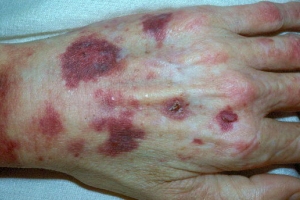Poverty often leads to a poor diet, and poor diets can lead to a host of health problems. Doctors in Springfield, Massachusetts, think they’ve identified a diet-related condition that many thought disappeared hundreds of years ago.
The medical mystery began with what looked like a skin infection. Doctor Eric Churchill was examining one of his colleague’s patients. The man had been admitted to Baystate Medical Center with strange bruises, swelling, and bleeding gums. But the bacterial tests came back negative. The doctors were stumped.
“And someone eventually thought to ask about this person’s diet,” he says.
Turns out the man had psychiatric issues and would only eat a few types of food.
“So for years had been eating nothing but bread and American cheese. And this had led to these very severe nutritional deficiencies,” Churchill says.
In fact, the patient’s Vitamin C levels were so low he qualified for a diagnosis these doctors hadn’t thought about in years: Scurvy. Yes, the same scurvy rampant in the 1700s among British sailors who would go months or years without fresh food. They’d lose teeth, become lethargic, and sometimes hemorrhage to death.
“One of the problems of talking about scurvy in modern populations is no one thinks it’s a disease of modern times,” Churchill says.
At that point, in 2010, Churchill and the other Baystate doctors went ‘huh.’ They figured it was an isolated case, prescribed vitamin C tablets, and moved on.
A few months later, Churchill saw a patient with a long history of stomach complaints. They learned this patient, who also had mental illness, had eaten nothing but ice cream for six months. With the previous case on their minds, they checked his vitamin C levels, and bingo. Scurvy.
“And we began to start asking a little bit more about people’s eating habits,” Churchill says, “and particularly in people who were isolated and who had a lot of significant issues with depression, schizophrenia, bipolar disorder, that sort of thing.”
Over the next five years, the team tested about 120 patients at the High Street clinic in one of Springfield’s poorest neighborhoods. They found at least 30 cases of scurvy — more than any previous study. This was especially surprising, Churchill says, since the nutritional bar for scurvy is so low. Never mind grapefruit and kale….
“You can have a handful of McDonald’s ketchup packets a day, and that’ll give you enough vitamin C to keep yourself from contracting scurvy. ”
In other words, these people were eating virtually no fruits or vegetables. And since their general fitness was poor, their symptoms — like fatigue, easy bruising, joint pain — had been attributed to other diseases. This was the first time anyone mentioned scurvy.
“Some people didn’t know what it was,” Churchill recalls. “Others were kind of shocked, because — ‘scurvy? is that ‘Aar! Pirates!’ I think certainly for some people it was a bit of a sobering moment.”
It was certainly surprising for Mark, a 49-year-old maintenance worker who did not want his last name used.
“I never heard of any of my other counterparts having it,” he says.
Mark is slightly overweight with a round face and sweet demeanor. He’s had poor health since childhood – including diabetes and heart disease. So last year when his gums started bleeding and he felt run down, he didn’t take much notice. Eventually he went for a check up at the High Street clinic, where Dr. Churchill tested his vitamin C levels, and diagnosed scurvy.


